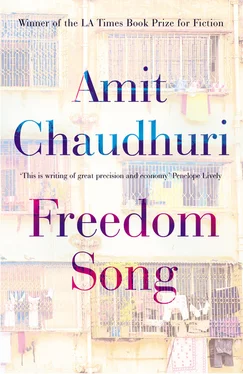And now they said he had been a King’s Commission Engineer, one of the ‘heaven-born’. But, after he died, the family had been left with nothing; and later he had become this portrait in this house on Vidyasagar Road gifted to Bhola by his father-in-law, now confronted by Sandhya. Something of his aptitude and perhaps the romance of engineering had been inherited by the family, shaping and influencing lives that were generations removed from him; generations to come that had never known him; for Borda’s younger son was an engineer; Bhola had tried to cast himself in his father’s mould and become a civil engineer, and created Goodforce Literod Ltd.; even Manik was studying engineering in Germany. In this way the grandfather that no one knew had lived on in his children’s and grandchildren’s lives.
Summer was everywhere. Meanwhile, Sandhya began to embroider a piece of cloth and make a doll’s dress inside her room. She was always making things; now a bangled hand pushed a thread through a needle. One shoulder leaning on an elbow, her sari’s aanchal falling abstractedly from her back, she pursued her handiwork.
Bhaskar was still something of an enigma in her life; she hardly knew him at all; and he reappeared in the evenings after his long journey from Howrah, tired. Then he would wash his face and feet beneath the tap in the small bathroom and there would be a far-away rush of running water. Emerging, he would quickly survey his reflection hovering darkly in the bedside mirror. One evening, lying on the bed in the glare of the electric light, he asked her:
‘What’s this?’
For he had picked up the small shiny blue dress that had been left inadvertently next to a pillow. It was as if some tiny, subtle spirit that had perhaps visited this room had divested herself of her clothing before disappearing.
‘Oh, that. . that’s something I made over the last two days when I had nothing else to do,’ she said, raising her face briefly.
He lifted it nakedly up to the light.
‘It’s a little small for you,’ he said, indifferent.
She knew very little about the company, too little; nothing but seeing Bhaskar become each morning a person who wore pleated trousers and a shirt and shoes before disappearing to a factory that made cranes. ‘Take me to it one day,’ she said without meaning it.
And he knew nothing about her. In marrying each other they had in effect embraced the unknown and the inconsequential. To look at, she might have been anyone; sometimes he would notice how her shoulders looked tenderly hunched and rounded when she was sitting down; the next day he checked to see if it was still true, as if reality could not be relied upon not to change at short intervals; during this time everything he saw in her he saw with a child’s guilty and inquisitive eye.
But she and her husband hardly had any time together. They met in the morning at the dining-table as acquaintances would, the reverberations of night-time already having faded and left them almost more distant from each other. Bhaskar did not look at her in the presence of others; he as good as pretended she wasn’t there; and then he was gone for most of the day. The first days of their marriage was a time of trust in the unproven and of unspoken longing.
Having grown up elsewhere, she had no friends in Calcutta. A few relatives lived on the outskirts of Calcutta, and others even further away. Now and then her brother appeared, dark and bespectacled and much like her to look at, and then disappeared again. And for the first month and a half of their marriage, Bhaskar took her quite for granted.
At night their fingers and hands crept towards each other, in the greed for closeness, and for those sensations, only incompletely experienced so far, of something between pain and satisfaction, concealment, and happiness.
Upstairs was where their new life began, beneath the photographs of late and ever-present grandparents. Where Bhaskar’s and Manik’s and Piyu’s childhood had begun and evolved and come to a conclusion, where they’d slept together on the bed in often anarchic and filial positions, played between and under the beds and bruised themselves, another existence began at last.
She had become used to the lane which, at first, had kept her from sleep.
Early in the morning, when it was not quite light, she sometimes sensed him going out; it was inexplicable; she sighed; and then once or twice she saw him return with a pile of newspapers, the Ganashakti. It was a paper she’d never read; but Bhaskar insisted to her, with what seemed to her an excessive and uncomfortable advocacy, that it contained all the real and important news and all that was really worth reading. She didn’t believe him; for Ganashakti was a paper that no one she knew read; it was, as far as she knew, used to make cartons and containers in the market; and its pages were swept away in lanes and alleys. These early morning excursions of his became indistinguishable to her sometimes from the intense dreams she had before waking.
She kept herself to herself and still hadn’t quite made friends with the family. During her solitary explorations, she found old comic books, toys, beneath the staircase to the terrace. And she discovered near a doll with an arm missing and a Ludo board a set of tiny pots and pans — kitchen utensils. Though they were old now, they must have once been used by Piyu to cook make-believe meals for an imaginary husband and family, or probably just for the sake of imitating the motions of cooking. How possessive children are about their imaginary homes! — almost as proprietorial as they are when they grow up and have real ones. Sandhya found them when clearing away piles of other things that had been dumped beneath the stairs to the terrace (she was beginning to rearrange this floor which would be her household), their small but exact shapes lying overturned, but still intact.
And then she put artificial flowers and leaves, imitations of tulips, roses, in two vases. She had loved these so much, almost as if they were alive — she had bought them from a small stall in Gariahat and carried them back crowded in her arms. They, however, turned out to be a less than perfect replica, the edge of the leaf frayed, with a few short strands of loose thread hanging from it.
‘Why don’t you get real flowers?’ asked Bhaskar one day.
‘If I have real flowers,’ said Sandhya, ‘they’ll die in a couple of days — and then who’ll give me the money to buy new ones: you?’
‘But these will get dirty in a week,’ he said.
‘They won’t,’ said Sandhya, aware of some protective magic which would keep the dust from getting to the flowers; and with such conviction did she say it that for a moment Bhaskar was convinced as well. Thus the perennially blooming flowers, cheap, bright, immortal blossoms, remained.
They had still not been on their ‘honeymoon’; and the crows made an unbroken, troubled din outside and hopped about relentlessly. But they’d put all the cheques they’d got as wedding presents into a bank account; part of it they’d use for their trip. And as they spoke, weighing the size of their budget against their expected expenditure, India, in their imaginations, became a series of small hotels, connecting routes, different climates existing at once, peculiarities of cuisine.
She’d always wanted to go to Kashmir. And yet that paradise had been poisoned. How wonderful it was to wander through India with your parents as a child (she blurredly remembered travelling to strange places — this was such a large country — when her mother was alive; there was no death then, nor destiny), then to forget most of it, except a stomach upset that had made you sick or a sari being bought by your mother in a shop or the paleness of a white hotel façade, and then have a sense of it come back to you many years later as you prepared to make the journey with another person, almost a stranger.
Читать дальше












